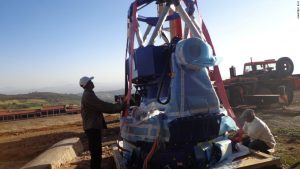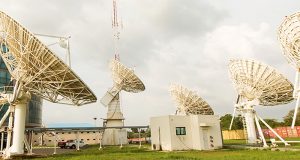In the past, we have looked to nations such as Russia and the United States for our inspiration in space. For decades, these countries have dominated the space sector. However, new national players are emerging, proving that space is no longer the domain of the richest and most powerful nations. SpaceWatch Middle East contributing editor Helen Jameson, gives her take on Satellite Sovereignty in emerging countries.
Africa: Too Soon?

However, it’s not just the Middle East region that is staking its claim in space. Africa is also set to make its mark as an emerging space continent. Nigeria already has its own space programme, as does South Africa and Ghana, Uganda and Kenya which have all established space agencies.
This inevitably throws up a series of other questions, especially when countries that are considered developing or underdeveloped are pursuing space ambitions. Some of these African nations are receiving international aid. If a country cannot feed its own people, should it really be developing a national space programme that will soak up billions in research and development?
Just recently, Ethiopia announced its bold intentions in space, yet the country itself is receiving aid from other countries to help millions of starving people. This creates a moral argument that says space should be placed far down the list of priorities for a nation that simply cannot afford it. Others would argue that this is necessary in order to improve the quality of life of its people. The dilemma is obvious.
SpaceWatch Middle East recently reported that, on January 3 2017, the Ethiopian government announced its intention to build its own medium-sized space launch vehicle and to develop the capabilities to domestically build satellites. Ethiopia is one of the world’s poorest nations yet it expects the maiden launch of its launch vehicle to take place within the next three years.
A spokesperson for the Ethiopian Ministry of Science and Technology (MOST), Wondwosen Andualem, pointed out that Ethiopian capacity and capability to build its own satellites is increasing, thanks in part to the partnerships forged by Ethiopia with foreign governments and companies. The Ethiopian government has already stated that it seeks to develop and build satellites for the purposes of national security, disaster management and response, and land management. However, MOST intends to build the launch vehicle and satellites locally with minimum reliance on foreign partners.
Ethiopia has forayed into the realms of rocket development before in 2015, when the Mekele Institute of Technology launched a rocket called Alpha Meles to an altitude of 30 kilometres.

Two large telescopes have also been built as part of an observatory on Mount Entoto, supported by Saudi-Ethiopian businessman Mohammed Al Amoudi. In addition, October 2016 saw the formation of the Ethiopian Space Science and Technology Institute and Council. Activities are really gathering momentum.
The primary purpose of the space programme is to bring about change in the country in terms of agriculture and farming. This is desperately needed. If the nation can farm sustainably through Earth Observation and also reap the benefits that communications can bring through education, space technology makes enormous sense. However, that said, it is going to be enormously expensive. It’s a very fine balance.
If a space programme can be developed successfully, then the rewards for Ethiopia could be enormous. But does the fact that this would be developed for the benefit of the people make it okay to continue to receive foreign aid?
One African country that is quite advanced in its space initiative is Nigeria, though the country is also still in reception of foreign aid.
In 2001, the National Space Research and Development Agency (NASRDA) was established to pursue the application of space science and technology for socio-economic benefits for Nigeria. The commercial entity that runs the operation of Nigerian satellites is NigComSat and the Nigerian government has launched a total of 5 satellites into space.
NASRDA initially invested in Earth Observation satellites, as these satellites are most helpful in terms of developing different sectors of the economy. NigeriaSat-1, 2 and X are all EO satellites, built by UK manufacturer SSTL. Nigerian engineers were trained during the manufacture of the satellites. The training and transfer programme enabled the Nigerian engineers to develop their knowledge and understanding and take it back to Nigeria to teach others. NigeriaSat-1 was an experimental payload and was retired after 8 years. However, both 2 and X continue to provide very high resolution imagery that enable the Nigerian government to develop a range of market sectors including: agriculture and crop monitoring; oil and gas; minerals; forestry; land administration; transport; the environment; security and defence; tourism; census; health and water resources.

In 2007, NigComSat, the commercial satellite operator of Nigeria, launched NigComSat-1 which was the first African geosynchronous communications satellite. The satellite, however, suffered an anomaly in its solar array and ran out of power in 2008. This was followed by the launch of NigComSat-1R which was orbited in 2011 and the communications satellite now provides a variety of communications services to the Nigerian people such as e-government, telecommunications, tele-education, telemedicine and DTH services. Like NigComSat-1, the satellite was constructed by China Great Wall Industry Corporation (CGWIC) and the companies have since cooperated on further projects. In January 2016, NigComSat sent a delegation to China and this was followed by the signing of a framework agreement in March 2016 for the building of 2 additional communications satellites, NigComSat 2 and 3. In June, a stakeholders workshop was held on satellite navigation technology and services between NigComSat and CGWIC that assessed the need for navigation applications across various government agencies and identified needs and trends.
It is hoped that the two new satellites will boost the critical ICT need in Nigeria and help to shape and further develop the country socio-economically. NigComSat Managing Director, Abimbola Alale, has been noted as saying that the addition of the new satellites will boost customer confidence and that Nigeria should not be a lone satellite operator. It requires a fleet of satellites to address broadcast, security, maritime and the rest of the ICT sector.
National Development and National Pride
Space means many things to many people. To some, it offers the opportunity to become involved in an incredible and constantly evolving industry. To others, it is a vital connection to precious technology and connectivity. It can be a lifeline, or it can help to monitor the environment, to recover from disasters and, for many, it is a matter of national pride. A national space programme gives independence to countries and makes them less reliant on others. It empowers nations, and now that small satellite technology has opened the door for much more affordable space programmes, it offers the opportunity of space to developing nations as well as developed ones.
However, the question of justifying the cost of a space initiative is one that looms large, and whilst the socio-economic benefits are obvious, the investment that has to be made to kick off a space programme is enormous. Partnerships and collaboration can help considerably, but the fundamental stumping up of cash is critical and whilst a government may see the long-term benefits of launching a satellite into space, the rest of the world looks critically on. Why should other countries send aid to a nation that cannot even afford to feed its own people, yet alone build a satellite and get it to space? That said, space programmes have to begin somewhere. Should space simply be for those who can afford it? Space is becoming more affordable, and it can help to solve some significant problems through the provision of critical data, imagery and communications.
The socio-economic benefits of space programmes are undeniable. It is enormously encouraging to see such interest in space from players that, ten years ago may not have even given space a second thought in terms of their country’s future. In nurturing a space industry, nations, such as the ones we have read about here, are investing in the future of their people and the world as a whole. It is true that we have to look to our skies and beyond our planet both today and in the future. However, the question will always dominate of just how much of a priority space actually is to countries that have more fundamental problems facing them.
Original published at: http://spacewatchme.com/2017/01/satellite-sovereignty-part-2/
 SpaceWatch.Global An independent perspective on space
SpaceWatch.Global An independent perspective on space

